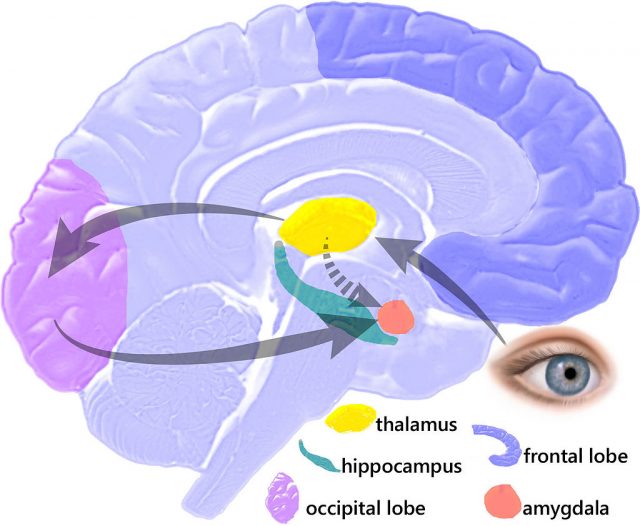
Editor’s Note: This website is not designed to, and should not be construed to, provide medical advice, professional diagnosis, opinion or treatment to you or any other individual, and is not intended as a substitute for medical or professional care and treatment.
~
Just like other organs in the body, the brain needs to purge toxins, such as viruses, heavy metals, pathogens, and infections.
It is during sleep that our brain unplugs and detoxifies, as it is constantly engaged during our waking hours.
While we sleep, the metabolic activity of our brain goes up by about 10 times the normal amount. The cerebrospinal fluid moves quickly across the brain tissue in a sweeping motion around the neurons, removing toxins and delivering oxygen and nutrients, and then exits along the veins. Research shows that the neurons in the brain actually shrink by about 60 percent to make room for this cerebrospinal fluid to move through our brain.
How Toxins Accumulate in the Brain
Toxins accumulate in the brain from microbes in the mouth that don’t physiologically belong there. For example, chronically inflamed tonsils or sinuses, dental amalgams, infected root canals, gums, or cavities in the jaw bone create toxins that then need to drain from the brain down through the lymph channels on the side of the neck.
Unfortunately, the lymphatic system needs to be functioning optimally in order for toxins to be removed from the brain. If you think of the body like a hydraulics system, where congested tissue downstream prevents optimal flow upstream, congested lymphatic vessels in the neck impede drainage of toxins from the brain.
If lymph flow is congested, these toxins linger near and migrate into nerve endings. From there, the toxins move in the nerves toward the brain stem where they impact the face and other brain nerves. Heavy metals and sulfur toxins have a high affinity to nerves. Because of the immense networking of sensory nerves and in the autonomic nervous system, toxins are quickly absorbed in massive amounts.
Vagus Nerve Toxicity
One of the greatest dangers to our health is the contamination of the vagus nerve, one of the most important channels for sending messages to and from the brain to the body. The vagus nerve is the longest nerve in the body and serves as the “master controller” for our immune cells, organs, and stem cells along with our mood, digestion, memory, cognitive function, blood pressure, and many other aspects of our health.
The vagus nerve is one of two extremely long cranial nerves. It starts at the base of the brain and travels down the neck on both sides of the body (behind the earlobe on the mastoid bone). “Vagus” is Latin for “wandering,” and as the name implies, the vagus nerve travels through the body, networking the brain with every organ of digestion along with the lungs, heart, spleen, intestines, liver ox, and kidneys. It also connects with a range of other nerves involved in speech, eye contact, facial expressions, and even our ability to tune in to other people’s voices.
It is an extremely important channel of communication between the brain and body and plays a critical role in the body’s ability to maintain homeostasis and general health. For example, it is the vagus nerve that releases the neurotransmitter acetylcholine, which signals the heart rate to slow down.
Poor health often can be traced to an infected or poisoned vagus nerve, as it impacts the whole central nervous system.
Vagus Nerve Toxicity Impedes Health
A toxic vagus nerve impedes all downstream function of the digestive system, leading to malabsorption, constipation, or leaky gut. Malabsorption then contributes to the accumulation of large molecular matter in the lymph, which further triggers allergic immune responses and intolerances. As the vagus nerve controls contraction in the digestive process, a toxic vagus nerve leads to poor or mis-regulated intestinal motility, contributing not only to constipation, but also imbalances in the gut. All this contributes to SIBO, IBS, and candida overgrowth.
Similarly, since the vagus nerve signals the release of acetylcholine to slow heart rate, a toxic vagus nerve can lead to cardiac issues. Root canals are often correlated with heart attacks for this very reason. The communication from the gut to the nervous system and the brain is also compromised, impairing the immune system and contributing to autoimmune reactions.
Vagus Nerve Toxicity Contributes to Nutrient Malabsorption
There is a correlation between malabsorption of nutrients and vagus nerve infections. If the parasympathetic state isn’t triggered, the stomach releases insufficient stomach acid and doesn’t properly break down and assimilate nutrients, like proteins. If the pancreas fails to excrete sufficient enzymes, our food won’t be digested properly, leading to the growth of pathogenic microbes further down the colon.
Essential Oils to Support Brain Detoxification
Moving our fluids is critical to detoxifying the brain, especially for the systems that are composed of and transport fat through the body. This namely affects the lymphatic system, which helps transport fats and fat-soluble vitamins throughout the body, and the brain which is composed of roughly 60 percent fat.
It therefore makes sense that fat-soluble essential oils serve as powerful tools in accessing these systems, especially when fat digestion or assimilation is compromised, as is often the case when gallbladders are removed or damaged.
We can use essential oils to support sleep and vagus nerve signaling to help heal a toxic nerve and lymphatic drainage. For sleep, we can consider blends that are relaxing like lavender, spikenard, or valerian root. We can apply stimulatory essential oils to the vagus nerve (behind the earlobe on the mastoid bone) to activate its downstream parasympathetic signals. We can also apply frankincense along the sides of the neck to help open up and support lymphatic flow.
~
~
~
Author: Jodi Sternoff Cohen
Image: Wikimedia Commons
Editor: Danielle Beutell
Copy Editor: Callie Rushton
Social Editor:








Read 13 comments and reply